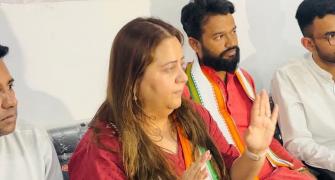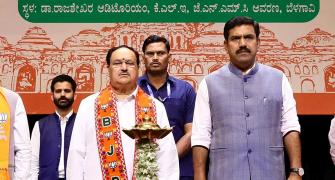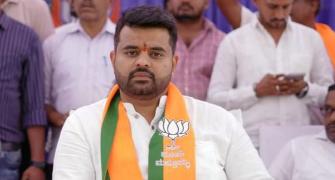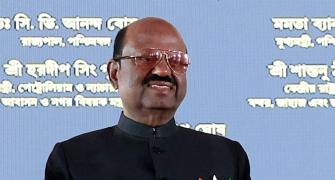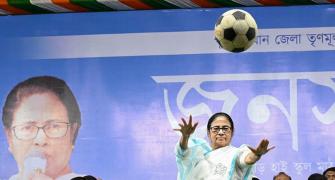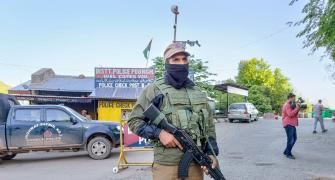In a strong presentation, Foreign Secretary Shyam Saran took on critics of the Indo-US nuclear co-operation deal, rubbishing various 'wish-lists' being circulated by the nonproliferation lobby about the Indian nuclear plants to be listed as civilian or military.
The presentation comes before his meeting with US Secretary of State Condoleezza Rice and two days of discussions with his diplomatic counterpart Nicholas Burns to hammer out a plan the Bush administration can present to Congress regarding the separation of India's civilian and military nuclear facilities that will make the US-India civilian cooperation deal a reality.
 In a question and answer session that followed his speech on 'Transforming India-US Relations: Building a Strategic Partnership,' at the Carnegie Endowment for International Peace, Saran, taking the first question from rediff.com, ridiculed reports that listed various nuclear facilities in India these groups wanted separated, and declared, "There will be as many wish lists and as many separation plans as there are experts.
In a question and answer session that followed his speech on 'Transforming India-US Relations: Building a Strategic Partnership,' at the Carnegie Endowment for International Peace, Saran, taking the first question from rediff.com, ridiculed reports that listed various nuclear facilities in India these groups wanted separated, and declared, "There will be as many wish lists and as many separation plans as there are experts.
"[But] it is not our intention to negotiate this through the media or the think-tanks," he said, explaining that it would be negotiated only through the Joint Working Group that he and Burns head.
Saran said, "We will be addressing the separation plan on the basis that this has to be an efficient, credible one ... It should not - at least as far as we are concerned - impact adversely on our strategic program."
He did not respond immediately to questions about the nuclear nonproliferation lobby's statements about India having diverted plutonium from its Canadian-supplied CIRUS reactor, meant for peaceful purposes only, over to its nuclear weapons program. This has prompted Canada to urge New Delhi and Washington to "place the CIRUS reactor on the civilian side of the fuel cycle and under IAEA [International Atomic Energy Agency] safeguards."
Saran said these issues would be addressed at the appropriate time, asserting that India had "not departed from any of our international commitments."
Without disclosing if he had decided on a specific separation plan, he acknowledged this would be the focus of his discussions with Rice and Burns. Both of them have made it clear they need a credible plan before they go to Capitol Hill to try and convince lawmakers to approve the necessary changes to make real the July 18 accord between President George W Bush and Prime Minister Manmohan Singh.
"Yes, I have come with certain ideas about the separation of Indian civilian and military facilities," he said, but reiterated, "the best forum to discuss this is the Joint Working Group."
Many arms control specialists and nonproliferation experts at the packed, standing room-only auditorium at Carnegie, asked Saran why India, for all its professed nonproliferation commitments, would not put a moratorium on fissile material production as other major nuclear weapons states have done. Many experts have been seeking this as a condition before Congress approves the deal. Saran argued these were issues not covered by the US-India Joint Statement that specifically dealt only with the issue of civilian nuclear cooperation between the US and India.
"The important thing to remember here is that the July 18 statement is not about India's strategic program. It is an agreement about civilian nuclear energy cooperation between India and the United States," he told the audience.
"Pursuing that civilian nuclear cooperation with the United States, what India is willing to do is to give assurances to its partners that whatever is coming as technology cooperation from partners will not be diverted to India's strategic program and will not be diverted to third countries," he said.
As far as the Fissile Material Cut-off Treaty is concerned, Saran said, "We are committed to the negotiation of a multilateral, certifiable Fissile Material Cut-off Treaty in the Conference of Disarmament."
On the issue of full-scope safeguards on India's civilian nuclear reactors once the separation was completed and agreed to by the US, Saran said India had absolutely no problem with that, as long as "there is a guarantee or assurance of lifetime supply of fuel. Then we would not have a problem with lifetime safeguards."
He pointed out that whatever safeguards were applicable would have to take into account the provisions of the US-India Joint Statement, which he said has clearly recognized that while India has a civilian nuclear program, it also has a military program. So it was not apply the same rules to India as would be applied to the non-nuclear weapons states that had signed the Non-Proliferation Treaty.
Saran acknowledged that India was not recognized as a nuclear weapons state under the NPT, but asserted that there was clearly recognized that "India has a military program and a civilian program and whatever safeguards are finally agreed upon with the IAEA will have to take this factor into account."
Earlier in his speech, Saran took hefty swipes at the campaign launched by the nonproliferation lobby to torpedo the deal, saying, "The debate so far does not appear to have done full justice to the real issues involved."
He noted that the arguments essentially revolved around the agreement being a departure from the NPT regime, but this missed the point.
Saran said, "If we go by NPT concepts and objectives rather than its literal text, then it is difficult to make a case against the July 18 agreement.
"Bringing India into the fold," he said, "is not only a gain for international nonproliferation efforts but indispensable for the emergence of a new global consensus on nonproliferation in response to current challenges." He added, "Any objective assessment of efforts to counter WMD proliferation would surely put a high value on Indian participation."
Saran also took on nonproliferation experts who have argued that India has made no new commitments on July 18 but simply restated its current policies. "Even assuming that this is true, it then begs the question whether the nonproliferation record of India should be diminished, even devalued, merely because it can be taken for granted."
He added: "One may as well suggest that the US should only reward those who stray from nonproliferation norms, not those who observe them! I might add, particularly for the benefit of those who are partial to this line of reasoning, that by strengthening its export control regime and committing to non-transfer of reprocessing and enrichment technologies and to international efforts to limit their spread, India has actually undertaken additional commitments that place it in an 'NPT plus' category."
Saran argued that "if India's past record and current policies are not recognized, and, worse still, if it is to be equated with those whose record in this respect is more than suspect, then our nonproliferation objectives may enjoy the comfort of noble intentions but not the efficacy of practical action."
He warned that the improvements members of the nonproliferation lobby have been seeking, and asking Congress not to approve the deal unless New Delhi acquiesces, "are deal-breakers and are intended as such." He said the moratorium of fissile material production was one such "and was not part of this agreement and will not become so."
Saran concluded,, saying, "Indo-US relations are at a crossroads. We have two clear choices before us. One is the road that we have traveled before one that will maintain the status quo and the distance between our two democracies."
"The other," he said, "not without its challenges, recognizes the enormous changes of the last decade, appreciates the resulting opportunities, and is prepared to depart from established positions to realize a genuine strategic partnership."
Saran declared such a partnership could make Indo-US ties one of the principal relationships of the international system, and expressed confidence that this positive view would be reflected in the outcome of President Bush's visit to India early next year.

